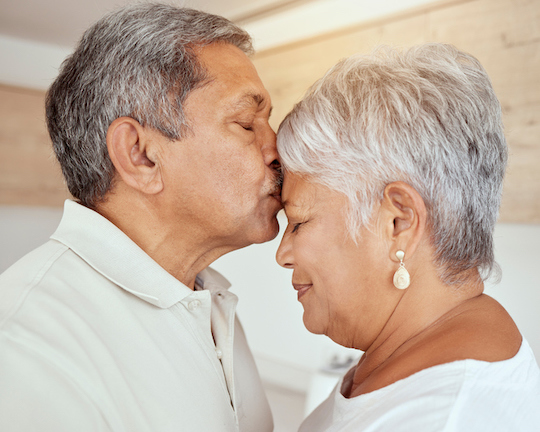Relationships: Kind and Accepting or Controlling?
By Dr. Margaret PaulJanuary 09, 2023
The choice to be kind and accepting in your relationship, rather than controlling, is a vital choice regarding creating a loving relationship.
 What if there is one choice you can make that will heal many of your relationship problems? The good news is that there actually is: you can choose to be kind and accepting - both to yourself and others.
What if there is one choice you can make that will heal many of your relationship problems? The good news is that there actually is: you can choose to be kind and accepting - both to yourself and others.
However, for many people, there is another choice far more important to them than kindness and acceptance. This is the choice to attempt to control others' feelings and behavior, control outcomes, and control their own painful feelings.
What is Your Deepest Desire?
Kindness to yourself and to others and acceptance for yourself and others comes from a desire to support your own highest good and the highest good of others. When your highest priority is to support the highest good of all, you are naturally kind and accepting. You don't even have to think about it. It flows easily when your deepest desire is to be a loving, caring person.
But when your deepest desire is to protect yourself from getting hurt, then your automatic choice, particularly in conflict, is likely to attempt to control - with anger, withdrawal, blame, judgment, compliance, or resistance.
Jack knew that he loved his wife, Jenny. Yet as soon as Jenny didn't do what he wanted or expected, he would immediately become angry, blaming, and judgmental. Jenny, frightened of his anger and of losing his love, would immediately defend and then comply with Jack's wishes, hoping to have control over his feelings and behavior toward her.
Jenny was afraid to do what she wanted to do. She constantly monitored her behavior, telling herself, "Jack will get mad if I do that."
With all this anger, defensiveness, and compliance, the fun, joy, and passion that had been so wonderful at the beginning of their relationship was often non-existent.
They sought my help because their marriage was in trouble, and they wanted to save it. They both loved their two small children and didn't want to break up the family.
As the couple worked through the control issues that each had learned in their families, they started to have fewer conflicts. Yet when a conflict did arise, each would automatically revert to their old behavior.
The Assignment that Changed their Relationship
"I am going to give both of you an assignment," I told them in one of our sessions. "It is a simple assignment, although not at all easy. This week, I want both of you to focus on being kind to yourselves and to each other, and to fully accept yourselves and each other. You will not be able to be kind and accepting with each other if you are not being kind and accepting with yourselves.
Jack, if you do not take loving care of yourself, you will end up feeling angry with Jenny. Jenny, if you are not taking loving care of yourself, you will end up trying to control Jack with your defensiveness and compliance. I know both of you try very hard to be kind and accepting with your children. I want both of you to practice treating yourselves and each other with the same kindness and acceptance with which you treat your children."
Both Jack and Jenny agreed to practice this assignment.
The next week in their session, both of them claimed that the first four days of the last week had been the best days in years.
"But then we slipped back into our old patterns," said Jack. I forgot about kindness and acceptance. Why is it so hard to remember?"
"Jack, both you and Jenny have been practicing your controlling behaviors for your whole lives. These patterns are not easy to change. Your automatic unconscious response to fear is to control in some way. It takes a lot of practice for these patterns to change. You need to consistently practice Inner Bonding, making a conscious choice to be kind and deeply accepting of each other rather than slipping into the unconscious choice to control. It’s the consistent practice of Inner Bonding that creates the new neural pathways in the brain for the loving adult."
Today, Jack and Jenny's relationship is much improved. While they still occasionally revert to their controlling behavior, they are able to be kind and accepting much more of the time - a result of their dedicated Inner Bonding practice. They are having more fun with each other, and their sexual relationship has greatly improved.
Heal your relationships with Dr. Margaret’s 30-Day online video relationship course: Wildly, Deeply, Joyously in Love.
 Send this article to a friend
Send this article to a friend  Print this article
Print this article  Bookmarked 1 time(s)
Bookmarked 1 time(s)
| Related Articles |
|---|
| Forgiveness: Acceptance and Letting Go |
| Relationships: Control or Kindness |
| Kindness vs. Control |
| Are Kindness and Tenderness Signs of Weakness? |
Comments
| Author | Comment | Date |
|---|---|---|
| Join the Inner Bonding Community to add your comment to articles and see the comments of others... | ||

Daily Inspiration
Today, focus on telling your truth with the important people in your life - the truth about you and who you are, not about them and who they are. Notice when you want to change the truth or to withhold something. Notice if there is fear of being completely honest with your truth of who you are. What is your fear?
By Dr. Margaret Paul

 Share with Del.icio.us
Share with Del.icio.us Share with Digg
Share with Digg






